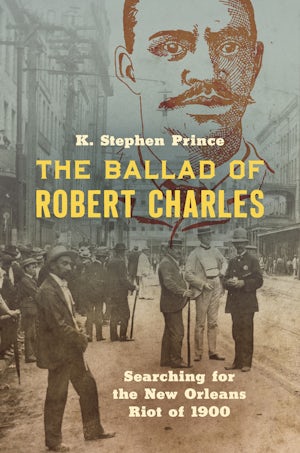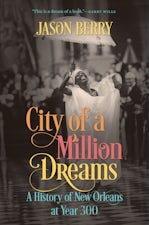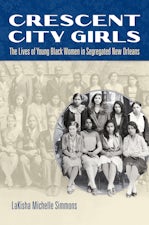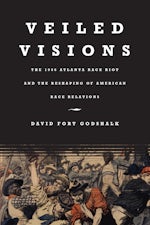The Ballad of Robert Charles
Searching for the New Orleans Riot of 1900
By K. Stephen Prince
264 pp., 6.125 x 9.25, 15 halftones, 8 maps, 3 tables, notes, bibl., index
-
Paperback ISBN: 978-1-4696-6182-7
Published: March 2021 -
Hardcover ISBN: 978-1-4696-6181-0
Published: March 2021 -
E-book PDF ISBN: 979-8-8908-5565-7
Published: February 2021 -
E-book EPUB ISBN: 978-1-4696-6183-4
Published: February 2021
Buy this Book
- Paperback $27.95
- Hardcover $95.00
- E-Book $22.99
For Professors:
Free E-Exam Copies
Awards & distinctions
2021 Kemper and Leila Williams Prize in Louisiana History, The Historic New Orleans Collection and the Louisiana Historical Association
2022 President's Book Prize, Society for Historians of the Gilded Age and Progressive Era
Finalist, 2022 Association for the Study of African American Life and History Book Prize
In this fascinating work, K. Stephen Prince sheds fresh light on both the history of the Robert Charles riots and the practice of history-writing itself. He reveals evidence of intentional erasures, both in the ways the riot and its aftermath were chronicled and in the ways stories were silenced or purposefully obscured. But Prince also excavates long-hidden facts from the narratives passed down by white and black New Orleanians over more than a century. In so doing, he probes the possibilities and limitations of the historical imagination.
About the Author
K. Stephen Prince is an associate professor of history at the University of South Florida. He is also author of Stories of the South: Race and the Reconstruction of Southern Identity, 1865-1915.
For more information about K. Stephen Prince, visit
the
Author
Page.
Reviews
"A well-told and imaginative work of history that should inform the study of racial violence and the American South for years to come . . . . In addition to writing the definitive history of the 1900 New Orleans Riot, Prince brilliantly pinpoints the ways in which a riot and its repercussions continued to shape race relations in New Orleans and the United States for more than a century."—David Godshalk, Journal of the Gilded Age and Progressive Era
“The Ballad of Robert Charles is something new; it forces its reader to reexamine the role of geography, memory, and silence in the project of writing the histories of populations muted by poverty and racism. And for that this work is not only interesting. It is vital.”—Criminal Law and Criminal Justice Books
“[Prince’s] study of Robert Charles and the social upheaval attached to his name opens new directions for American and southern historians of police power and Black rebellion. . . . Readers will find few heroes or villains in his account, and fewer injunctions. Instead, The Ballad of Robert Charles seeks to understand the manifold violence necessary to maintain white supremacy in America.”—Agricultural History
“Prince meticulously recovers the history of Robert Charles, whose rebellion against police brutality, white terror, and the retreat from Reconstruction inspired a ‘song too dangerous to sing’ in the wake of the New Orleans Riot of 1900. The Ballad of Robert Charles is an engaging, accessible, must-read book that offers insights for our present national reckoning over race and policing.”--Hilary Green, University of Alabama
"The Ballad of Robert Charles is as much about the nature of historical inquiry as it is about the shocking race riot for which Robert Charles is known. It is smart and wonderfully written, brimming with fresh insights."--Lawrence N. Powell, Tulane University
“Prince treats the 1900 New Orleans Riot as a prism through which to explore the everyday and spectacular state-sponsored and extralegal violence plaguing Black lives at the dawn of the twentieth century. In doing so, Prince resurrects the ghosts of a disavowed past to speak to enduring problems of race and the right to the city.”--Shirley E. Thompson, University of Texas at Austin




